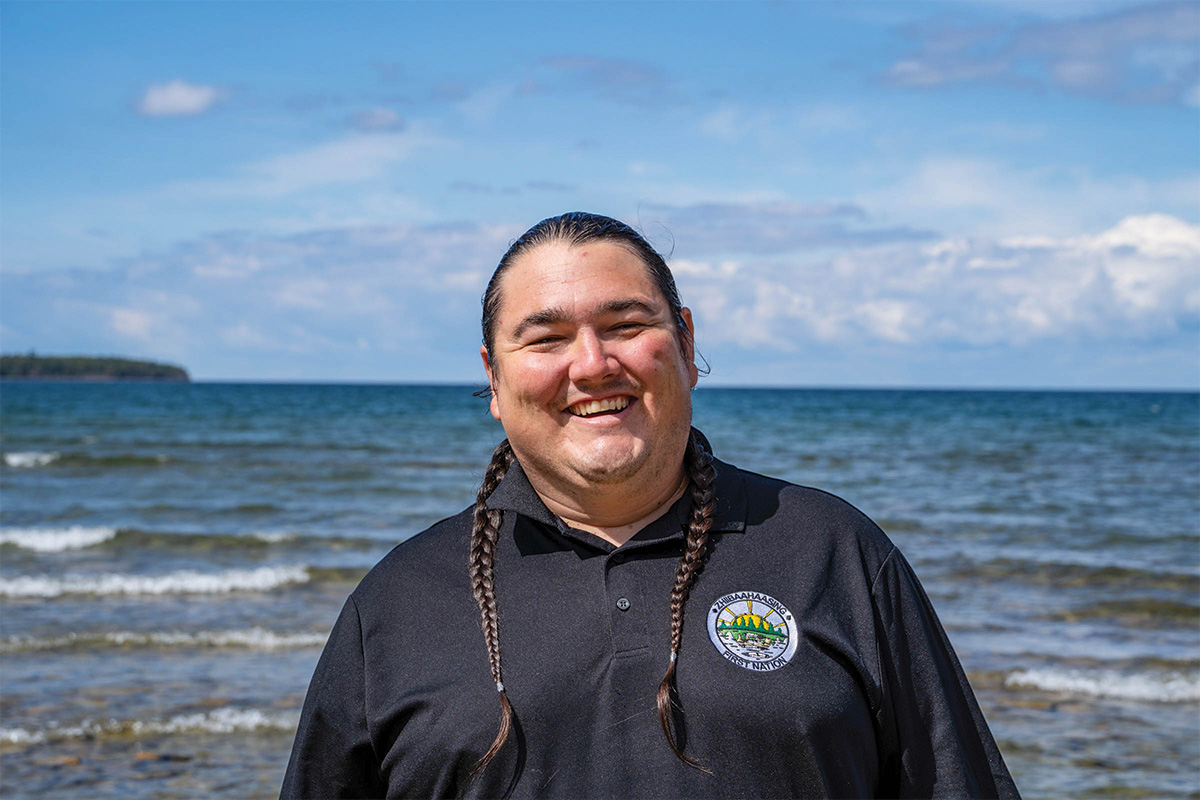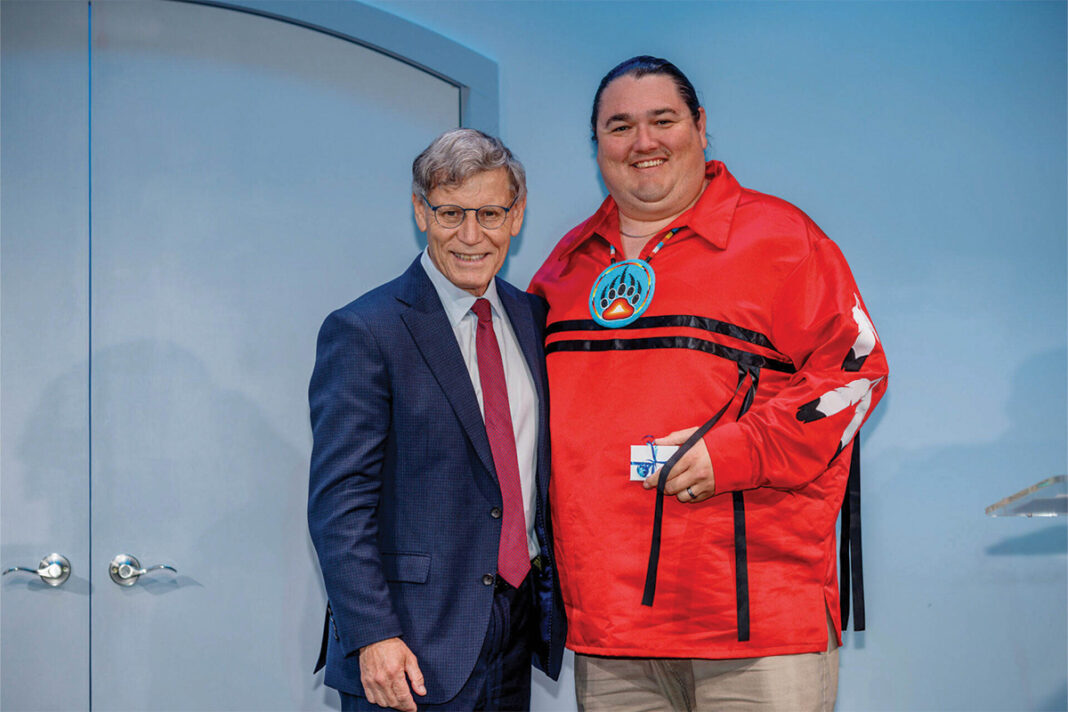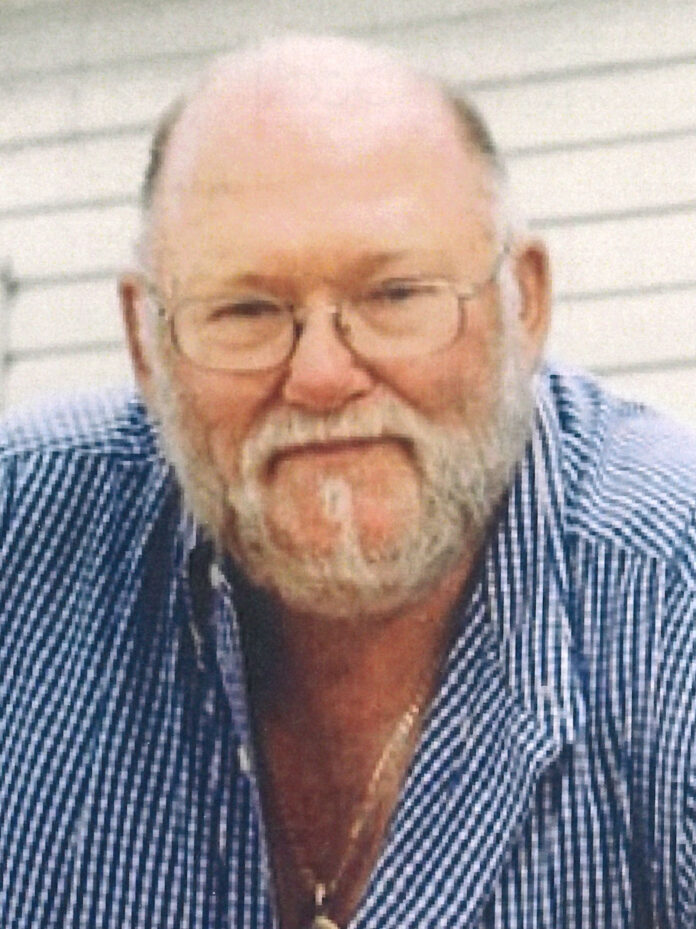ZHIIBAAHAASING—Jonathan Riberdy not only received a national recognition for his efforts in providing water to the community of Zhiibaahaasing First Nation despite several obstacles, but he also provided some very good news for the community recently last week.
“Jonathan Riberdy has taken a stressful and sometimes impossible-feeling situation and has used it to spread the word on the importance of water operators, especially in First Nation communities,” a Water Canada citation noted as he was presented with the 2024 Operator of the Year Award by Water Canada this past August. “Sit with him for a moment or two and he’ll share with you his dreams and aspirations to inspire the next generation in water. He’s not just an ideas guy, he’s a hard worker, driven to perfection, who finds in the little downtime he has, after juggling the needs of an underfunded and difficult to maintain water treatment plant to care for both his family and community.”
Water Canada celebrated the winners of the 2024 Water Canada awards on August 13. Hosted by Actual Media’s Content Director Lynds, the presentation of the 2024 Awards recognized individuals, projects and technologies that have made significant contributions to the water industry in Canada and beyond.
“I have been the water operator (operations and maintenance supervisor for Zhiibaahaasing) for nine years as of October,” Mr. Riberdy told The Expositor. “No, it has not been easy, especially when our old plant was decommissioned after high water led to the structural integrity of the facility. This came during COVID. There was no way to make water in the community; a company in M’Chigeeng First Nation was helping us trucking water up to us, as Sheshegwaning First Nation was already at its maximum capacity for its water treatment plant.”

A Water Canada story featuring Mr. Riberby explained, “The community has been under a boil water advisory since 1992 for a reason which might seem surprising. Instead of their water being conveyed by underground pipe it is delivered by truck from the community’s small treatment plant.”
Until 2020, Zhiibaahaasing was managing well enough with a small-scale treatment facility that drew its water from the lake rather than the ground and while there were several issues to deal with it was doing its job, said Mr. Riberdy. However, heavy rains in July 2019 sent the lake (Huron) water levels high enough that the waves eroded the shoreline and began to breach the water plant. He consulted Indigenous Services Canada about funding, and with Chief Irene Kells go ahead he came up with an emergency fix, hiring a private contractor, E. Corbiere and Sons Contracting from M’Chigeeng to build a berm that surrounded the facility.
This worked until the next spring when a rapid ice and snow melt drove the water levels up again and water got into the water plant. Then a wind storm damaged the plant shop and an engineer said that the water treatment plant had to be decommissioned.
“It was May (2020) during COVID and we had no water,” Mr. Riberdy told The Expositor.
“Zhiibaahaasing’s situation, while precarious, proved something of a watershed moment,” explained Water Canada. “Community leaders had long pressed ISC and its predecessors, the Department of Indian Affairs and Northern Development, for a full-scale treatment plant, complete with a small tower and piped distribution that would finally deliver certifiably potable water. For now, however, the sudden, urgent need for water diverted attention away from a long-term solution to simply restoring service for the community.”
Mr. Riberdy brought in BI Pure, a British Columbia company that builds standardized water treatment plants inside large shipping containers. Installed in late 2020, the sea can plant not only includes chlorination, filters to catch larger contaminants and UV disinfectant to eliminate smaller pathogens, but it also has a filling station for delivery trucks. “It was the fastest way to get us water during COVID,” he told Water Canada. “If we were to have built a building, we would have had to go through design and engineering, which takes a couple of years. The sea can was already engineered and built. All we had to do was make a few adjustments to make sure it would work for our community.”
Mr. Riberdy said that it took six months to prepare and deliver the sea can. In the meantime, the community put together a plan to get water for household and getting Bright Water Services (based in southern Ontario) to source water from M’Chigeeng, trucking it to residents three times a week. This he pointed out was the same delivery program he had in place with the band’s own truck before the decommissioning of the water plant.
In a public statement, Indigenous Service Minister Patty Hajdu said, “The expertise and commitment of water operators like Mr. Riberdy are vital in achieving our shared goal, ensuring that all First Nations communities have access to clean drinking water and maintaining strong water and wastewater infrastructure.”
Zhiibaahaasing residents can use the water for bathing and other uses, but still can’t drink the water. “What’s sad is that even when go the city, because the community has been under a water advisory (since the early 1990s) I won’t drink the water from the tap in the city. I’m not used to getting water from a tap. But I will drink it out of a bottle.”
“The emergency sea can has done its job and serves the purpose,” said Mr. Riberdy. “But we have been lobbying the federal government since 2019 for funding to provide for a brand new water treatment plant.” He said this government funding is going to be provided for the new water treatment plant, “to build a new water treatment plant and two stand pipes on top of the hill here in the community.” A ground-breaking is expected to take place in the next month or so, and by September 2026 the new water plant is to be constructed and operational.
In 2021 Mr. Riberby was awarded by ISC with the National First Nations Water Leadership Award.





